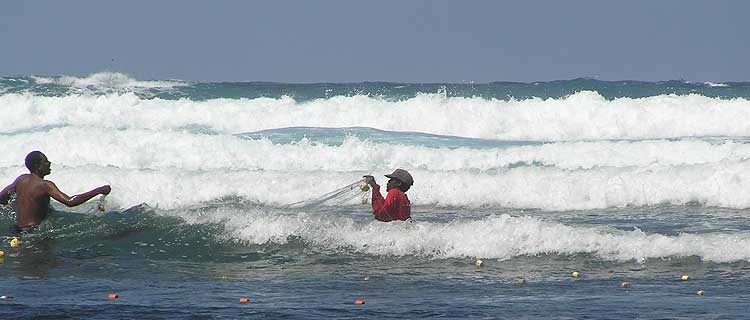
Centre researcher Tim Daw explains the challenges and opportunities for sustainable co-management in fisheries.
Marine resources
In the hands and minds of resource users
New management approaches help change people's ideas about human—environment interactions
What does it take to change management of marine resources from centralised and protectionist approaches to more collaborative management that share decision-making with poor resource users?
This is the central question of a new study published in Global Environmental Change by centre researcher Tim Daw and colleagues. They have studied this kind of a transition in Kenya, Madagascar and Tanzania.
Driven by ideology (and support)
Exploring the transformation to devolved resource governance in these three east African countries revealed a common pattern, explains Tim Daw:
"In all cases, the move toward co-management was driven largely by donor ideology and subsequent support. Likewise transfer of power created a degree of democracy in resource management that was not previously present, but in many cases, accountability remained upward to national governments, rather than downward to local actors."
The new study draws upon expertise and literature from both political science and linked social-ecological systems fields to explore five key governance transition concepts in the three east African countries: (1) drivers of change; (2) institutional arrangements; (3) institutional fit; (4) actor interactions; and (5) adaptive management.
Let's be friends
The study found that co-management can contribute to conflict resolution. For example, the Mombasa Park and Reserve in Kenya was established by presidential decree and put into law by legislation. This resulted first in resistance from local boatmen who had been ferrying tourists without paying park fees and fishers who were concerned about lost fishing grounds.
However, fear of loss of profits never materialised and the boatmen eventually became allies of the park service. The closure size was reduced from 10 km2 to six km2 and beach seines were removed in the reserve area up to three km from the park's southern border.
These changes have been stable and there is good evidence for reduced conflicts and increased incomes.
Not just in the hands of Gods
Daw and his colleagues also noticed a change in peoples' belief systems. They went from relying on metaphysical explanations of environmental change to the acknowledgement that human actions influence the natural environment.
This was for example the case in the octopus harvesting systems of southwestern Madagascar. Initially the discourse about octopus fishing was dominated by metaphysical explanations about yields. After experimentation with co-management based on rotational closure, people realised their actions can influence octopus abundance and catch rates.
"We saw a similar pattern in all countries, that experimentation with different forms of management provided a forum that contributed to changing people's ideas about human—environment interactions," says Tim Daw.
Related info
J.E. Cinner, T.M. Daw, T.R. McClanahan, N. Muthiga, C. Abunge, S. Hamed, B. Mwaka, A. Rabearisoa, A. Wamukota, E. Fisher, N. Jiddawi, Transitions toward co-management: The process of marine resource management devolution in three east African countries, Global Environmental Change, 10.1016/j.gloenvcha.2012.03.002
Tim Daw is an interdisciplinary researcher studying coastal resource systems. He has worked with a range of small-scale tropical and industrial high-latitude fisheries and has a background training in ecology, fisheries science, socioeconomics and politics.






